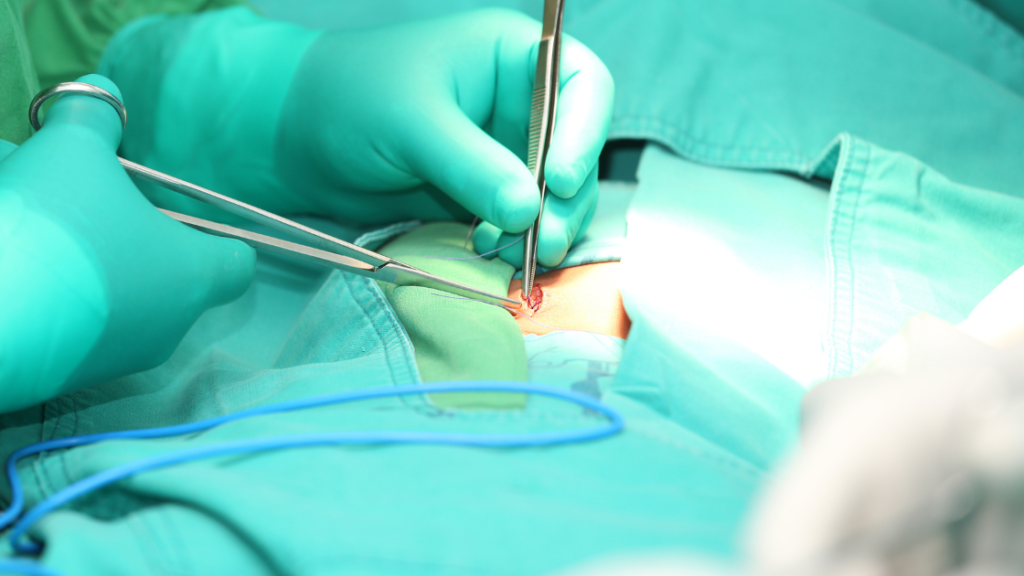Undergoing hernia surgery can be a daunting prospect for many.
However, with the right care and expertise, the journey towards healing and regaining normalcy can be significantly eased.
I’m Dr. Sandeep Sabnis, an expert hernia surgeon with extensive experience in handling complex hernia cases and employing advanced laparoscopic techniques for surgeries, including the innovative Single Incision Laparoscopic Surgery (SILS).
Understanding Hernia and Its Implications
A hernia occurs when an organ or fatty tissue squeezes through a weak spot in a surrounding muscle or connective tissue called fascia.
The most common types of hernias are in the abdomen. Hernias might not always be severely painful, but they don’t go away on their own and require surgical intervention to prevent potentially dangerous complications.
Hernias can manifest in various forms, with the inguinal hernia being the most common, affecting the groin area.
Other types include umbilical, which occurs around the belly button, and hiatal, which occurs when part of the stomach pushes through the diaphragm into the chest cavity.
Factors that can increase the risk of developing a hernia include heavy lifting, persistent coughing, obesity, and even genetics, leading to increased pressure within the abdomen and subsequently forcing tissues through weak spots in the muscle wall.
Symptoms of hernias vary depending on their type and location but often include a noticeable lump or bulge, which may be more apparent when standing or straining and may disappear when lying down.
Some hernias, like hiatal hernias, can lead to more internal symptoms, such as acid reflux or heartburn.
Although some hernias may be asymptomatic and only discovered during routine medical examinations, others can cause discomfort, pain, or even severe complications if left untreated.
Complications from untreated hernias can be severe, including obstruction, where a section of the intestine becomes trapped, leading to bowel obstruction with symptoms such as nausea, vomiting, and the inability to pass gas or stools.
Another serious complication is strangulation, where the blood supply to the part of the organ or tissue trapped in the hernia is cut off, leading to tissue death.
This condition requires immediate surgical intervention to prevent life-threatening situations.
These potential complications underscore the importance of seeking medical advice for any suspected hernia, as early detection and treatment can prevent further health issues.
Innovative Approaches to Hernia Repair
Hernia surgery is primarily performed using two methods: open surgery and laparoscopic surgery. In open surgery, a single large incision is made over the hernia site to repair the hernia with stitches, mesh, or both.
Laparoscopic surgery, on the other hand, involves making several small incisions through which surgical instruments and a camera are inserted to repair the hernia with mesh.
This method is less invasive, may result in less post-operative pain, and typically allows for a quicker recovery compared to open surgery. Both techniques aim to reinforce the weakened area and prevent the recurrence of the hernia.
The choice between open and laparoscopic hernia surgery is influenced by the specific type of hernia, its location, the patient’s overall health, and the surgeon’s expertise.
Laparoscopic surgery, with its minimally invasive approach, often leads to reduced post-operative discomfort and a quicker return to daily activities.
This technique also minimizes scarring and lowers the risk of infection. Regardless of the method chosen, the ultimate goal is to restore the integrity of the abdominal wall, ensuring a durable repair that minimizes the chances of hernia recurrence.
The decision on the surgical approach is made after a comprehensive evaluation, taking into consideration the benefits and potential risks to offer the best outcome for the patient.
The Path to Quick Recovery
Recovery from hernia surgery varies among individuals, but there are universal steps that can facilitate a smoother and quicker healing process. Here are five tips to help you on your path to recovery:
Follow Post-Operative Instructions Carefully: Adhering to your surgeon’s advice is the first step towards a speedy recovery. This includes guidance on wound care, activities to avoid, and when to resume normal activities.
Manage Pain as Advised by Your Doctor: Pain management is crucial for a comfortable recovery. Use medications as prescribed without overreliance. For many, over-the-counter pain relievers, when used as recommended, are sufficient.
Stay Active, But Don’t Overdo It: Gentle walks and light activities can help prevent blood clots and promote healing. However, it’s important to avoid strenuous activities or lifting heavy objects until your doctor gives you the all-clear.
Pay Attention to Your Diet: A nutritious diet aids in healing. Foods rich in fibre can prevent constipation, a common post-operative concern, especially when taking certain pain medications. Staying hydrated is equally important.
Attend All Follow-Up Appointments: Post-operative appointments allow your surgeon to monitor your recovery and address any concerns. It’s an opportunity to discuss any symptoms or issues and ensure everything is healing as it should be.
More Useful Tips
Engage in Mindful Relaxation Techniques: Stress can negatively impact your recovery process. Engaging in relaxation techniques such as deep breathing exercises, meditation, or gentle yoga can help reduce stress and promote healing.
These activities not only help in maintaining a positive mental state but also improve blood circulation, which is crucial for healing.
Avoid Smoking and Alcohol: Smoking can significantly delay wound healing and increase the risk of complications after surgery.
Similarly, alcohol consumption can affect your body’s ability to heal and may interact negatively with prescribed medications.
For a quicker recovery, it’s advisable to avoid smoking and limit alcohol intake until fully recovered.
Why Choose Nashik for Your Hernia Surgery?
Choosing the right surgeon and location for your surgery is pivotal. Nashik, with its serene environment and advanced medical facilities, offers an ideal setting for patients undergoing hernia surgery.
My practice here in Nashik emphasizes a patient-centred approach, ensuring that you receive personalized care tailored to your specific needs.
With over 16 years of experience and a focus on cutting-edge surgical techniques, my goal is to ensure the best outcomes for my patients.
Recovery from hernia surgery can be a smooth and manageable process with the right preparation and care.
By following these tips and choosing a surgeon with a comprehensive understanding of hernia treatment and surgery, you can look forward to a swift recovery and a return to your daily activities.
Remember, the key to a successful recovery lies not only in the surgical procedure itself but also in the post-operative care and lifestyle adjustments you make. As an expert in hernia surgery, I am here to guide you through this journey, ensuring that you receive the highest standard of care and support throughout your healing process.
If you are in Nashik or the surrounding areas and facing hernia-related issues, feel free to reach out.
Together, we can discuss your options, address your concerns, and pave the way for a healthier, hernia-free life.
Your well-being is my top priority, and I am dedicated to providing you with the care and expertise you need for a quick and effective recovery.




